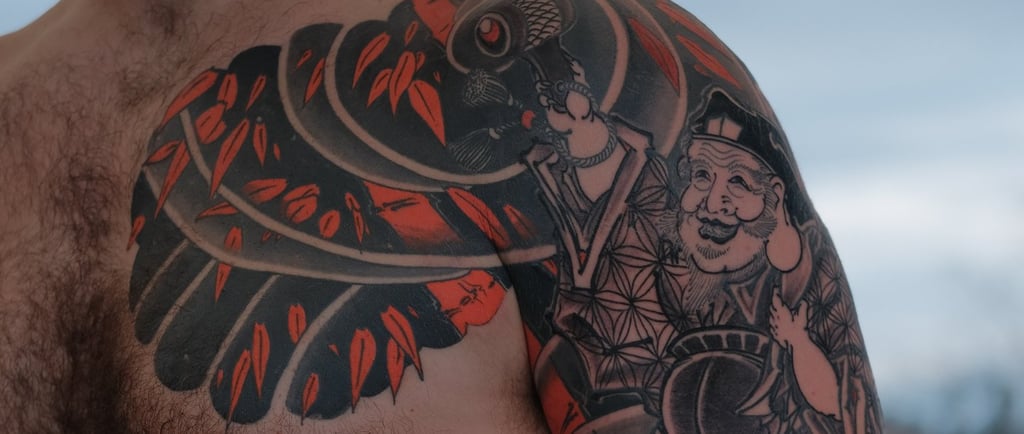
Daikokuten tattoo sleeve
daikokuten lucky tattoo sleeve meanings


Daikokuten (大黒天) is one of the seven good lucky gods, the "Great Black".
Originally was the Indian deity Mahakala. From the Indian pantheon, Mahakala moved to the Buddhist one, as one of the gods-protectors of the Buddhas from dark forces. In the 7th century, the Chinese monk Yijing, who went to India, mentioned in his travel notes the fact that he met two-armed statuettes of Mahakala, who is the patron saint of cuisine, in Indian temples.
This fashion has taken root in China, where Mahakala also became the patron of the kitchen. In the ninth century China was visited by the founder of the Tendai school, Saicho, who brought a figurine of Mahakala to Japan. Since the name "Mahakala" meant "Big Black", in Japan the god became known as Daikokuten, which was the literal translation of "Mahakala" from Sanskrit into Japanese. Due to the fact that the first characters of the name of the deity Okuninushi could be read as "Daikoku", a pun arose that led to the identification of Daikokuten with Okuninushi.
Since the XIV century, Daikokuten has firmly established itself among the seven gods of happiness, in the role of a kitchen god supplying food to believers. In this role, he began to present himself as a portly merchant, with a shoulder bag full of provisions. Among merchants, he came to be revered as the patron of business, and in western Japan he became the epitome of kami fields. He is also sometimes revered as the guardian god of the home. The animal messenger of Daikokuten is the mouse. Since the mouse rescued Okunikushi from the fiery trap of Susanoo, it is an additional reason for identifying Daikokuten with this god.
Daikoku tattoo meaning. Daikoku is one of the seven gods of happiness. Concurrently, he is also the deity of prosperity and wealth. Some people revere Daikoku as the patron saint of the hearth. Usually, when making a netsuke, he is depicted wearing a tori-eboshi hat, wearing a kariginu costume and, of course, with a bag of magic rice, which symbolizes wealth and wealth.
Japanese culture is known for its many unique traditions and beliefs, including the concept of lucky gods. These gods, also known as seven lucky gods or shichifukujin, are believed to bring wealth, health, and good fortune to those who worship and offer them respect. Each of the seven gods represents a different virtue or attribute, such as wisdom, happiness, and longevity. These gods are often depicted in art and statues around Japan, and their symbols are commonly used in various forms of Japanese media, such as anime and manga. Many people in Japan still hold strong beliefs in the power of the lucky gods, and they continue to be an important part of Japanese culture and tradition.
